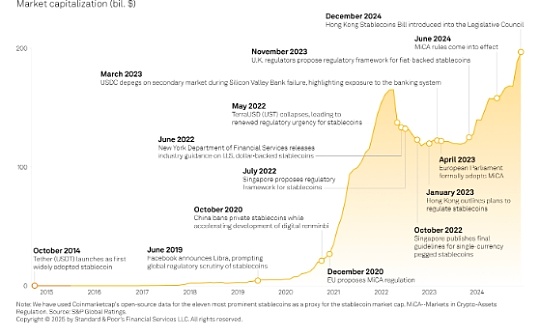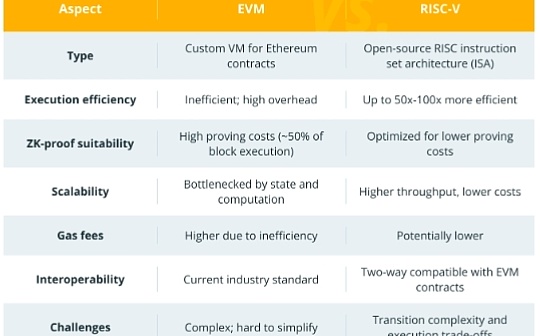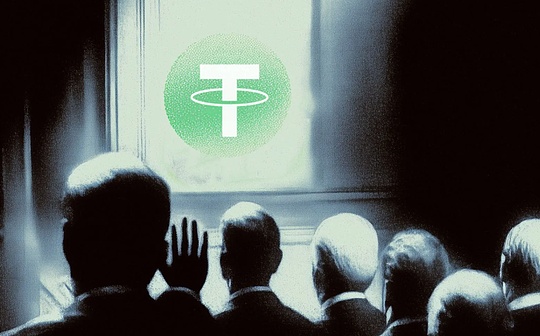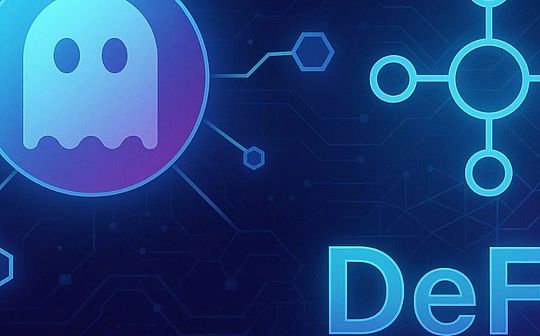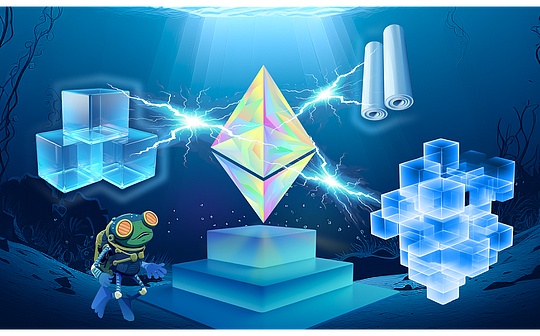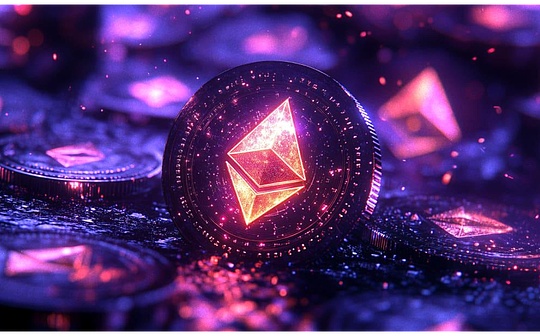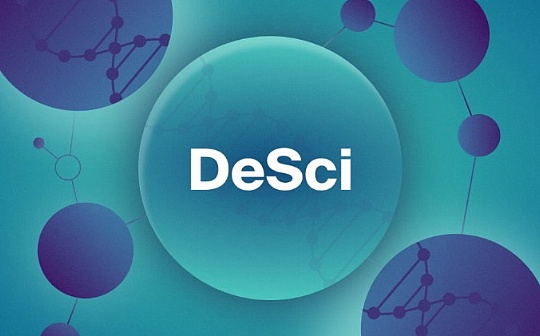
Author: Jagjit Singh, CoinTelegraph; Compiled by: Tao Zhu, Bitchain Vision
1. Understand traditional science (TradSci) and its limitations
Traditional Science (TradSci) represents the methodical search for knowledge through theory, experiments and observations.
Traditional science follows a centralized approach, with major publishers and institutions having disproportionate control over research.This leads to several drawbacks.Innovation tends to slow down due to competition and lack of funds.
For example, if a promising early plans are denied funding, potential breakthroughs may be hampered.The lengthy and biased publication process of high-impact journals may hinder timely exchange of knowledge.A study may take years to publish, which will hinder the ability of larger communities to expand these findings.
In addition, the paywall for published studies has set up access barriers, especially for independent researchers and the public.The system could hinder cooperation and ultimately reduce the potential impact of scientific advances.Tens of thousands of dollars undermine the idea that science should serve the public interest, because publishing a paper can cost.
There are open access preprint services like ArXiv, but they do not offer article-level tracking, authentication, or quality control.SciHub provides unauthorized access; therefore, an official, easy-to-access scientific platform is needed.Web3 provides the resources needed to create systems that ensure data integrity and encourage participation.
2. Decentralized science as an alternative to existing scientific systems
Decentralized Science (DeSci) within the Web3 framework is a transformation of the scientific research paradigm, characterized by four basic principles: motivation, transparency, decentralization and cooperation.
The transition from centralized institutions (a few entities control most of the power) to distributed networks (participants share most of the power) is called decentralization.This change reduces the power of information conveyors and increases inclusion by democratizing access to resources and decision-making.
DeSci emphasizes transparency and supports free and open access to methods, data and conclusions.DeSci makes scientific research more repeatable and credible by encouraging transparency to create an open and accountable environment.
Collaboration is at the heart of DeSci, which uses distributed networks to enable cross-border, censorship-resistant collaboration.DeSci promotes diversity of perspectives, sharing of expertise and group problem solving by eliminating institutional and geographical boundaries.
The decentralized autonomous organization (DAO) and tokens compensate researchers’ efforts are the driving force behind DeSci incentives.These rewards match individual interests with group goals that enhance knowledge, creativity, and social impact.DeSci promotes participation, creativity and preservation of scientific methods through economic incentives.
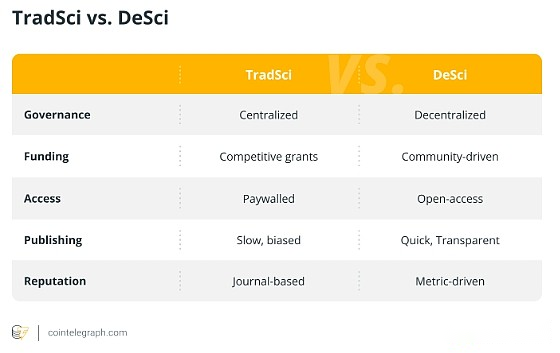
3. How DeSci works
DeSci uses blockchain for secure data storage, DAO for decentralized decision-making, and tokenization to incentivize research contributions and control intellectual property rights.
Due to its immutable and decentralized structure, blockchain technology ensures the security and reliability of data storage.Blockchain data can resist tampering and single point of failure because it is distributed across multiple nodes in the network.Each block in the blockchain has an encrypted hash value of the previous block, resulting in an ordered sequence of linked data blocks.Adding blocks into a chain ensures data integrity and security, because without most network approvals, it is impossible to change any earlier blocks from a computational perspective.
DAO is an important part of DeSci, enabling transparent and decentralized funding allocation and project governance.DAO allows stakeholders to manage resources and collaborate on decision making without the need for centralized intermediaries.They achieve this by using smart contracts on the blockchain network.Members of DAOs can use programmable governance mechanisms to implement rules, propose research plans and vote on them, and allocate cash for certain projects.
In DeSci, tokens and intellectual property non-fungible tokens (IP-NFTs) are crucial to encourage participation and asserting ownership of research results.IP-NFT allows researchers to tag their intellectual property rights (e.g. papers, data sets, patents) on the blockchain.Tokens can be used to coordinate incentives within the decentralized research community, compensate researchers’ contributions and encourage collaboration.
With IP-NFT, scholars can grant themselves ownership of transactions or licenses on blockchain platforms by tagging their intellectual property rights, including papers, databases, and patents.This encourages innovation and information sharing within the DeSci ecosystem by inspiring researchers to share their work publicly while maintaining ownership and control over their intellectual property rights.
4. The benefits of DeSci
DeSci promotes innovation and teamwork, democratizes access to scientific knowledge and creates a more inclusive and equitable research environment.
First, it encourages inclusion by lowering barriers to entry, enabling scientists from different locations and backgrounds to participate in and contribute to science projects.Furthermore, by providing open access to data, methods and results, DeSci promotes trust and openness, while promoting repeatability and peer review.
In addition, it allows researchers to collaborate in a decentralized, censor-resistant manner, thereby accelerating innovation and problem-solving, thereby fostering international cooperation.DeSci also proposes innovative incentive systems, including tokens and DAOs, to ensure that researchers are paid fairly and encourage participation.
IP-NFT allows researchers to retain control over their intellectual property, potentially tokenizing their work and incentivizing open sharing.In addition, DeSci can eliminate the paywall and democratize the access to research data and research results, thereby promoting a wider exchange of knowledge.
In the world of DeSci, trust and verifiable credentials are crucial.
V. Challenges Facing DeSci
If DeSci’s goal is to change research as expected, it faces challenges in ensuring data security, efficient DAO governance, blockchain scalability, legal gray zones and promoting inclusion.
Ensuring data security and integrity on decentralized networks faces enormous challenges, as bad actors may attempt to alter or tamper with research data.Furthermore, reaching an agreement in the DAO can be difficult and requires effective governance structures to manage competing interests and choices.
Furthermore, scalability remains a problem, as the high transaction volume and data volume of large research projects can be difficult to manage for blockchain networks.Legal issues and regulatory uncertainties related to data ownership and intellectual property rights further hinder widespread adoption.
Furthermore, it is crucial to overcome the digital divide and ensure that researchers from all geographical and socioeconomic backgrounds have equitable access to DeSci tools and resources.Overcoming these obstacles requires creative thinking, teamwork, and constant adjustments to adapt to the ever-changing decentralized technology landscape.

